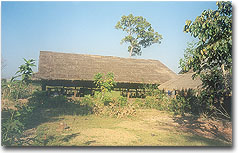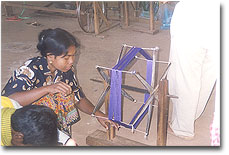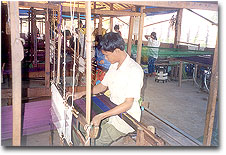Silk Weaving Project
One of the gaps which concerns those of us in the big cities and rich countries who are experiencing the digitalization of our lives, who are witnessing the rapid development of the Internet along with its ability to bring us greater knowledge, freedom and economic benefits, is the pitfall that little of this may be benefiting the developing world. Villages like Robib, unless we do something, are destined never to catch up.
The Internet, however, can bridge this gap. Cyber commerce, for one, can penetrate to Robib and we’d like to take a stab at it.
In creating this industry another village where silk weaving has developed was approached to establish a cooperative effort. Robib villagers would be trained there and the products of both villages would; be jointly sold through this Web site located in Robib.
Seven Robib villagers were recruited to volunteer to leave their homes to travel to Tbeng Meanchey, the provincial capital of Preah Vihear, and learn the art of silk weaving. Their families agreed to let them leave the farm temporarily in the hope they would return with newly gained ability to weave silk and supplement their meager incomes. Beyond that is the expectation that is an effort to restore the lost Khmer tradition of producing silk products, once regarded to be of the highest quality in the world.
Once they have absorbed all the training they will return to Robib to produce a variety of products we are offering you. The selection, listed on our order form, combines the products made by Robib villagers along with those by the handicapped workers of The Farm.
Proceeds of the sales will be distributed among the producers of the goods, and part of the fund will remain in a cooperative account to pay for the transport, training and living costs of other villagers who will be trained at The Farm. Orders may be paid for by check, international money order or by credit card.
The EMS (Express Mail Service) of the Cambodian postal service, which offers the lowest and most efficient courier service through the universal postal service, has agreed to send a truck to Robib whenever overseas orders total above $400 in postal fees and will ship out the packages, which are packed and addressed in Robib, to customers from the capital in Phnom Penh the next day. Thus, if this experiment in cyber commerce succeeds, customers may receive their orders as quickly as within one or two weeks. In the early stages it might take a few weeks. Join us in succeeding to bring cyber commerce through the Internet to remote villages like Robib everywhere in the world.
The funds are monitored by American Assistance for Cambodia, a non profit organization, registered as a 501(c)3 foundation by the U.S. Internal Revenue Service and persons placing orders may be assured of the credibility and transparency of this project.





